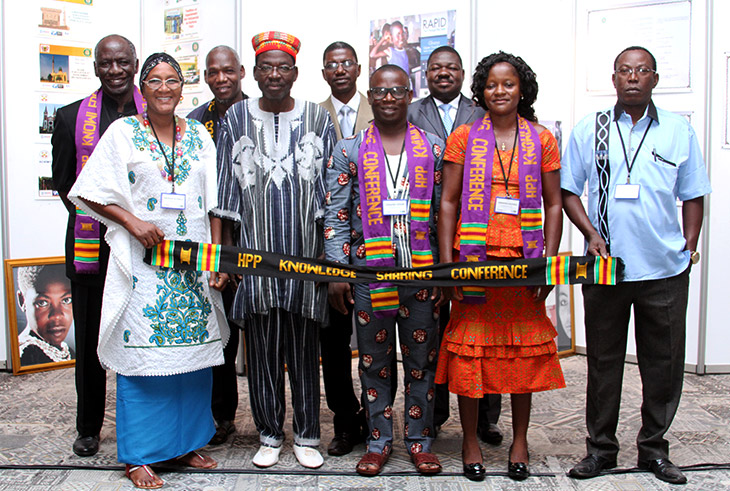The Health Policy Project ended in 2016. Work continued under Health Policy Plus (HP+) until 2022.
NEWS & VIEWS

Photo by Health Policy Project
August 3, 2015
The USAID- and PEPFAR-funded Health Policy Project (HPP) celebrated the project’s achievements at a two-day knowledge sharing event in Accra, Ghana, on July 21 and 22, 2015. Special guests were present from USAID/West Africa, Ghana’s Ministry of Health, the West African Health Organization (WAHO), and other implementing partners.
Modibo Maiga, HPP/West Africa project director, shared highlights from the project’s efforts to strengthen local partners’ capacity in developing effective policies and increasing commitments to improve access to family planning, reproductive health, and HIV services in 10 West African countries. Mr. Maiga said, “HPP was not just a project that empowered people to create lasting changes…but a substantive engagement that has built over the past years a great tradition, a solid culture, and lasting successes, which have saved and will continue to save the lives people in West Africa and around the world.”
A series of panel discussions reviewed lessons learned from policy and advocacy collaborations to strengthen government and civil society capacity around evidence-based advocacy and decision making, and to improve the enabling environment for family planning, reproductive health, and HIV policies. The event provided an opportunity for attendees to discuss the way forward to sustain policy and financing commitments in the region.
The knowledge sharing event gathered more than 100 attendees from 10 countries, including members of key populations, religious leaders, government representatives, civil society partners, and donors. The panelists discussed positive developments in the region, including
- New family planning advocacy tools and models developed by HPP, such as DemDiv, ImpactNow, and Costed Implementation Plan Gap Analysis
- Increased resource allocation from national budgets for contraceptives in Nigeria and Mauritania
- Increased uptake of modern contraceptive methods in districts of Togo where religious leaders conducted advocacy
- New policies and increased engagement of key populations at higher risk for HIV in advocacy and HIV planning in Burkina Faso and Togo
- The groundbreaking Dakar Declaration on Factoring Key Populations in the Response on HIV and AIDS in ECOWAS Member States
Looking to the future in his closing remarks, Alex Deprez, USAID’s Regional Director for West Africa said, “Despite these successes, the challenges remain enormous in the two areas of family planning and HIV: the implementation of innovative policies and strategies for scaling evidence-based interventions, integration of HIV and family planning programs, increased mobilization of domestic resources and the efficient management of available resources, the availability of quality human resources, the continued engagement of religious and traditional leaders as well as better coordination among the donor community; to only name those. This is evidently the target of our future efforts.”
Read more about HPP's work in West Africa here.
News: West African Religious Practices Support Family Planning
What's New
- Something to Build On: “Innovation Exchange” Celebrates the Health Policy Project’s Close and a New Beginning
- What Will it Take for Tanzania to Achieve ART Targets and Ensure Long-Term Sustainability of the HIV Response?
- Helping Kenya’s County Leaders Advocate for Increased Health Investments
- HPP Holds Working Meeting on Ensuring Responsible PEPFAR Transitions for Key Populations
- Health Policy Project Celebrates 2016 International Women's Day
- HPP Staff Participate in White House Conference on HIV Stigma Reduction

